【最新2018】ted演讲稿集(6篇)-word范文模板 (1页)
ted英语演讲稿(精选18篇)
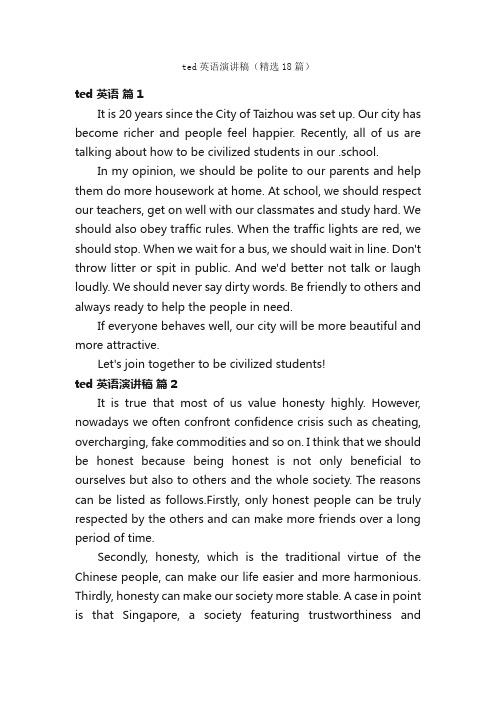
ted英语演讲稿(精选18篇)ted英语篇1It is 20 years since the City of Taizhou was set up. Our city has become richer and people feel happier. Recently, all of us are talking about how to be civilized students in our .school.In my opinion, we should be polite to our parents and help them do more housework at home. At school, we should respect our teachers, get on well with our classmates and study hard. We should also obey traffic rules. When the traffic lights are red, we should stop. When we wait for a bus, we should wait in line. Don't throw litter or spit in public. And we'd better not talk or laugh loudly. We should never say dirty words. Be friendly to others and always ready to help the people in need.If everyone behaves well, our city will be more beautiful and more attractive.Let's join together to be civilized students!ted英语演讲稿篇2It is true that most of us value honesty highly. However, nowadays we often confront confidence crisis such as cheating, overcharging, fake commodities and so on. I think that we should be honest because being honest is not only beneficial to ourselves but also to others and the whole society. The reasons can be listed as follows.Firstly, only honest people can be truly respected by the others and can make more friends over a long period of time.Secondly, honesty, which is the traditional virtue of the Chinese people, can make our life easier and more harmonious. Thirdly, honesty can make our society more stable. A case in point is that Singapore, a society featuring trustworthiness andintegrity, has a comparatively low criminal rate.Responsbility can be understood in many ways. for the parents , they have had the responsibility for caring for and fostering their children since the birth of their baby.for teachers,both in kindergartens and colleges,they also should be responsible for the study and life of their students,that is to say,teahers are the second parents of children somewhile.for us,as a friend of others,it is our responsibility to help our friends when they are in trouble or faced with difficulties. each one has the different responsibily based on their roles but we must take it for granted that we are responsible for the society. ted英语演讲稿篇3On the night of the elixir of love, in celebrate this holiday season, we came the 58th birthday of the motherland.At the same time, our students also welcomed a national holiday.The first day of the holiday, I finish the teacher assigned the homework first, and ready to go to sleep, thinking: this National Day seems so meaningless.How to have a meaningful National Day? Go to karaoke? To the playground play a variety of choice, I am not satisfied.By the way, I went to the yearning for a long time of fort worth. T o mother took me to, is a great surprise, mother agreed without hesitation. I am very happy, hurried in shoes, ready to go to fort worth!My mother and I get a ride to fort worth, so many people inside, and toys, I'm so happy, am unable to use language to describe.Mother gave me some a spring chicken, and a cup of milk tea, and I ate and drank, and almost died for joy.Eat, drink enough, should be good to have some fun! I came to the children's playground in the fort worth, in both the slide, and ride the toy car, it's fun.In eleven long holiday, every day is filled with laughter, live very substantial.In this National Day long vacation, I have already tasted the delicious food, play fun toys, both learning, finished holiday teacher assigned homework, do the best of both worlds, is a joy! ted英语演讲稿篇4Today is World Book Day, let us work together to remember the reader's festival. April 23 is the mean day of world literature, Cervantes, Shakespeare, Vega and many other world-famous writers born or died that day. In 1995, UNESCO this day each year as "World Book Day" to encourage people to discover the pleasure of reading.In recent years, the "World Book Day" has become a holiday country many readers. Bacon said: "Reading is to create a complete personality." For this reason, all countries regardless of level or civilian, regarded as a part of school life, and is a very important part. Even in highly developed network of the United States, the number of public library cardholders still as high as 148 million, that is one person every two Americans to hold reader card; According to statistics, the American people to the number of public libraries who are watching football, basketball, baseball, hockey combined total of more than five times the number of people.Human world famous love of reading in the Moscow subway, readily visible intellectuals who look carefully read intently. Moreover, these holding readers are reading voluminous care Weng Weng Tuo Soviet masters classics. The Japanese love ofreading is universally acknowledged, tram in Japan, on the bus, whether it is well-dressed office workers or students wearing uniforms, not much difference in concentration reading.Jews love reading. In every Jewish home, when the kids a little naive, and the mother will open the "Bible", drop a little honey on top, then called the children honey to kiss the "Bible" on. This ceremony is not evident intent: the book is sweet. Jewish cemetery often placed books, as "in the dead of night, the dead will come out of reading." Of course, this type of approach has some sense of meaning, that there is the end of life, knowledge was endless. There is also a Jewish family tradition from generation to generation, and that is to put bedside bookcase, if placed end of the bed, it will is considered disrespectful to the book.Our world-famous cultural thing big country, the importance of education and reading ages. There are a lot of hard studying ancient touching story, such as "cutting the wall to steal light" Kuangheng, "capsule firefly Yingxue" car Yin, cantilever Cigu the Sun Jing and Su, Ouyang Xiu, "the three" reading, studying hard Zhongyan stories, etc., for their book was born, and died for the book, for books and music, for the book and bitter, for the book and the poor, for the book and thin, how many thousands of years to the interpretation of the epic, awe-inspiring story .Another World Book Day has arrived, Book Day is to guide people to consciously name suggests reading, and develop reading habits. Reading is not just a matter of personal accomplishment and healthy personality progress, but the progress of the whole nation should be thinking big literate.To this end, our school this initiative: open book, read it; read the book, Liaoba! Hope to see all students take positive action tomake their own to develop a love of reading good habits to life every day as a school day.今天是世界读书日,请让我们一起来记念这个读书人的节日。
TED英文演讲稿范本 ted演讲稿精彩6篇

TED英文演讲稿范本ted演讲稿精彩6篇TED英语演讲稿篇一What I'd like to do today is talk about one of my favorite subjects, and that is the neuroscience of sleep.Now, there is a sound -- (Alarm clock) -- aah, it worked -- a sound that is desperately, desperately familiar to most of us, and of course it's the sound of the alarm clock. And what that truly ghastly, awful sound does is stop the single most importantbehavioral experience that we have, and that's sleep. If you're an average sort of person, 36 percent of your life will be spent asleep, which means that if you live to 90, then 32 years will have beenspent entirely asleep.Now what that 32 years is telling us is that sleep at some levelis important. And yet, for most of us, we don't give sleep a second thought. We throw it away. We really just don't think about sleep. And so what I'd like to do today is change your views, change your ideas and your thoughts about sleep. And the journey that I want to take you on, we need to start by going back in time."Enjoy the honey-heavy dew of slumber." Any ideas who said that? Shakespeare's Julius Caesar. Yes, let me give you a few more quotes. "O sleep, O gentle sleep, nature's soft nurse, how have I frighted thee?" Shakespeare again, from -- I won't say it -- the Scottish play. [Correction: Henry IV, Part 2] (Laughter) From the same time: "Sleep is the golden chain that ties health and our bodies together." Extremely prophetic, by Thomas Dekker, another Elizabethan dramatist. But if we jump forward 400 years, the tone about sleep changes somewhat. This is from Thomas Edison, from the beginning of the 20th century. "Sleep is a criminal waste of time and a heritage from ourcave days." Bang. (Laughter) And if we also jump into the 1980s, some of you may remember that Margaret Thatcher was reported to have said, "Sleep is for wimps." And of course the infamous -- what was his name? -- the infamous Gordon Gekko from "Wall Street" said, "Money never sleeps."What do we do in the 20th century about sleep? Well, of course, we use Thomas Edison's light bulb to invade the night, and we occupied the dark, and in the process of this occupation, we've treated sleep as an illness, almost. We've treated it as an enemy. At most now, I suppose, we tolerate the need for sleep, and at worst perhaps many of us think of sleep as an illness that needs some sort of a cure. And our ignorance about sleep is really quite profound. Why is it? Why do we abandon sleep in our thoughts? Well, it's because you don't do anything much while you're asleep, it seems. You don't eat. You don't drink. And you don't have sex. Well, most of us anyway. And so therefore it's -- Sorry. It's a complete waste of time, right? Wrong. Actually, sleep is an incredibly important part of our biology, and neuroscientists are beginning to explain why it's so very important. So let's move to the brain.Now, here we have a brain. This is donated by a social scientist, and they said they didn't know what it was, or indeed how to use it, so -- (Laughter) Sorry. So I borrowed it. I don't think they noticed. Okay. (Laughter)The point I'm trying to make is that when you're asleep, this thing doesn't shut down. In fact, some areas of the brain areactually more active during the sleep state than during the wake state. The other thing that's really important about sleep is that it doesn't arise from a single structure within the brain, but is tosome extent a network property, and if we flip the brain on its back -- I love this little bit of spinal cord here -- this bit here is the hypothalamus, and right under there is a whole raft of interesting structures, not least the biological clock. The biological clocktells us when it's good to be up, when it's good to be asleep, and what that structure does is interact with a whole raft of other areas within the hypothalamus, the lateral hypothalamus, the ventrolateral preoptic nuclei. All of those combine, and they send projections down to the brain stem here. The brain stem then projects forward and bathes the cortex, this wonderfully wrinkly bit over here, with neurotransmitters that keep us awake and essentially provide us with our consciousness. So sleep arises from a whole raft of different interactions within the brain, and essentially, sleep is turned on and off as a result of a range ofOkay. So where have we got to? We've said that sleep is complicated and it takes 32 years of our life. But what I haven't explained is what sleep is about. So why do we sleep? And it won't surprise any of you that, of course, the scientists, we don't have a consensus. There are dozens of different ideas about why we sleep, and I'm going to outline three of those.The first is sort of the restoration idea, and it's somewhat intuitive. Essentially, all the stuff we've burned up during the day, we restore, we replace, we rebuild during the night. And indeed, as an explanation, it goes back to Aristotle, so that's, what, 2,300 years ago. It's gone in and out of fashion. It's fashionable at the moment because what's been shown is that within the brain, a whole raft of genes have been shown to be turned on only during sleep, and those genes are associated with restoration and metabolic pathways.So there's good evidence for the whole restoration hypothesis.What about energy conservation? Again, perhaps intuitive. You essentially sleep to save calories. Now, when you do the sums, though, it doesn't really pan out. If you compare an individual who has slept at night, or stayed awake and hasn't moved very much, the energy saving of sleeping is about 110 calories a night. Now, that's the equivalent of a hot dog bun. Now, I would say that a hot dog bun is kind of a meager return for such a complicated and demanding behavior as sleep. So I'm less convinced by the energy conservation idea.But the third idea I'm quite attracted to, which is brain processing and memory consolidation. What we know is that, if after you've tried to learn a task, and you sleep-deprive individuals, the ability to learn that task is smashed. It's really hugely attenuated. So sleep and memory consolidation is also very important. However,it's not just the laying down of memory and recalling it. What's turned out to be really exciting is that our ability to come up with novel solutions to complex problems is hugely enhanced by a night of sleep. In fact, it's been estimated to give us a threefold advantage. Sleeping at night enhances our creativity. And what seems to be going on is that, in the brain, those neural connections that are important, those synaptic connections that are important, are linked and strengthened, while those that are less important tend to fade away and be less important.Okay. So we've had three explanations for why we might sleep, and I think the important thing to realize is that the details will vary, and it's probable we sleep for multiple different reasons. But sleep is not an indulgence. It's not some sort of thing that we can take onboard rather casually. I think that sleep was once likened to an upgrade from economy to business class, you know, the equiavlent of. It's not even an upgrade from economy to first class. The critical thing to realize is that if you don't sleep, you don't fly. Essentially, you never get there, and what's extraordinary about much of our society these days is that we are desperately sleep-deprived. So let's now look at sleep deprivation. Huge sectors of society are sleep-deprived, and let's look at our sleep-o-meter. So in the 1950s, good data suggests that most of us were getting around about eight hours of sleep a night. Nowadays, we sleep one and a half to two hours less every night, so we're in the six-and-a-half-hours-every-night league. For teenagers, it's worse, much worse. They need nine hours for full brain performance, and many of them, on a school night, are only getting five hours of sleep. It's simply not enough. If we think about other sectors of society, the aged, if you are aged, then your ability to sleep in a single block is somewhat disrupted, and many sleep, again, less than five hours a night. Shift work. Shift work is extraordinary, perhaps 20 percent of the working population, and the body clock does not shift to the demands of working at night. It's locked onto the same light-dark cycle as the rest of us. So when the poor old shift worker is going home to try and sleep during the day, desperately tired, the body clock is saying, "Wake up. This is the time to be awake." So the quality of sleep that you get as a night shift worker is usually very poor, again in that sort of five-hour region. And then, of course, tens of millions of people suffer from jet lag. So who here has jet lag? Well, my goodness gracious. Well, thank you very much indeed for not falling asleep, because that's what your brain is craving.One of the things that the brain does is indulge in micro-sleeps, this involuntary falling asleep, and you have essentially no control over it. Now, micro-sleeps can be sort of somewhat embarrassing, but they can also be deadly. It's been estimated that 31 percent of drivers will fall asleep at the wheel at least once in their life, and in the U.S., the statistics are pretty good: 100,000 accidents on the freeway have been associated with tiredness, loss of vigilance, and falling asleep. A hundred thousand a year. It's extraordinary. At another level of terror, we dip into the tragic accidents at Chernobyl and indeed the space shuttle Challenger, which was so tragically lost. And in the investigations that followed those disasters, poor judgment as a result of extended shift work and loss of vigilance and tiredness was attributed to a big chunk of those disasters.So when you're tired, and you lack sleep, you have poor memory, you have poor creativity, you have increased impulsiveness, and you have overall poor judgment. But my friends, it's so much worse than that.(Laughter)If you are a tired brain, the brain is craving things to wake it up. So drugs, stimulants. Caffeine represents the stimulant of choice across much of the Western world. Much of the day is fueled by caffeine, and if you're a really naughty tired brain, nicotine. And of course, you're fueling the waking state with these stimulants, and then of course it gets to 11 o'clock at night, and the brain says to itself, "Ah, well actually, I need to be asleep fairly shortly. What do we do about that when I'm feeling completely wired?" Well, of course, you then resort to alcohol. Now alcohol, short-term, youknow, once or twice, to use to mildly sedate you, can be very useful. It can actually ease the sleep transition. But what you must be so aware of is that alcohol doesn't provide sleep, a biological mimicfor sleep. It sedates you. So it actually harms some of the neural proccessing that's going on during memory consolidation and memory recall. So it's a short-term acute measure, but for goodness sake, don't become addicted to alcohol as a way of getting to sleep every night.Another connection between loss of sleep is weight gain. If you sleep around about five hours or less every night, then you have a 50 percent likelihood of being obese. What's the connection here? Well, sleep loss seems to give rise to the release of the hormone ghrelin, the hunger hormone. Ghrelin is released. It gets to the brain. The brain says, "I need carbohydrates," and what it does is seek out carbohydrates and particularly sugars. So there's a link between tiredness and the metabolic predisposition for weight gain.Stress. Tired people are massively stressed. And one of the things of stress, of course, is loss of memory, which is what I sort of just then had a little lapse of. But stress is so much more. So if you're acutely stressed, not a great problem, but it's sustained stress associated with sleep loss that's the problem. So sustained stress leads to suppressed immunity, and so tired people tend to have higher rates of overall infection, and there's some very good studies showing that shift workers, for example, have higher rates of cancer. Increased levels of stress throw glucose into the circulation. Glucose becomes a dominant part of the vasculature and essentially you become glucose intolerant. Therefore, diabetes 2. Stress increases cardiovascular disease as a result of raising bloodpressure. So there's a whole raft of things associated with sleep loss that are more than just a mildly impaired brain, which is where I think most people think that sleep loss resides.So at this point in the talk, this is a nice time to think, well, do you think on the whole I'm getting enough sleep? So a quick show of hands. Who feels that they're getting enough sleep here? Oh. Well, that's pretty impressive. Good. We'll talk more about that later, about what are your tips.So most of us, of course, ask the question, "Well, how do I know whether I'm getting enough sleep?" Well, it's not rocket science. If you need an alarm clock to get you out of bed in the morning, if you are taking a long time to get up, if you need lots of stimulants, if you're grumpy, if you're irritable, if you're told by your work colleagues that you're looking tired and irritable, chances are you are sleep-deprived. Listen to them. Listen to yourself.What do you do? Well -- and this is slightly offensive -- sleep for dummies: Make your bedroom a haven for sleep. The first critical thing is make it as dark as you possibly can, and also make itslightly cool. Very important. Actually, reduce your amount of light exposure at least half an hour before you go to bed. Light increases levels of alertness and will delay sleep. What's the last thing that most of us do before we go to bed? We stand in a massively lit bathroom looking into the mirror cleaning our teeth. It's the worst thing we can possibly do before we went to sleep. Turn off those mobile phones. Turn off those computers. Turn off all of those things that are also going to excite the brain. Try not to drink caffeine too late in the day, ideally not after lunch. Now, we've set about reducing light exposure before you go to bed, but light exposure inthe morning is very good at setting the biological clock to thelight-dark cycle. So seek out morning light. Basically, listen to yourself. Wind down. Do those sorts of things that you know are going to ease you off into the honey-heavy dew of slumber.Okay. That's some facts. What about some myths?Teenagers are lazy. No. Poor things. They have a biological predisposition to go to bed late and get up late, so give them a break.We need eight hours of sleep a night. That's an average. Some people need more. Some people need less. And what you need to do is listen to your body. Do you need that much or do you need more? Simple as that.Old people need less sleep. Not true. The sleep demands of the aged do not go down. Essentially, sleep fragments and becomes less robust, but sleep requirements do not go down.And the fourth myth is, early to bed, early to rise makes a man healthy, wealthy and wise. Well that's wrong at so many different levels. (Laughter) There is no, no evidence that getting up early and going to bed early gives you more wealth at all. There's nodifference in socioeconomic status. In my experience, the only difference between morning people and evening people is that those people that get up in the morning early are just horribly smug.(Laughter) (Applause)Okay. So for the last part, the last few minutes, what I want to do is change gears and talk about some really new, breaking areas of neuroscience, which is the association between mental health, mental illness and sleep disruption. We've known for 130 years that in severe mental illness, there is always, always sleep disruption, butit's been largely ignored. In the 1970s, when people started to think about this again, they said, "Yes, well, of course you have sleep disruption in schizophrenia because they're on anti-psychotics. It's the anti-psychotics causing the sleep problems," ignoring the fact that for a hundred years previously, sleep disruption had been reported before anti-psychotics.So what's going on? Lots of groups, several groups are studying conditions like depression, schizophrenia and bipolar, and what's going on in terms of sleep disruption. We have a big study which we published last year on schizophrenia, and the data were quite extraordinary. In those individuals with schizophrenia, much of the time, they were awake during the night phase and then they were asleep during the day. Other groups showed no 24-hour patterns whatsoever. Their sleep was absolutely smashed. And some had noability to regulate their sleep by the light-dark cycle. They were getting up later and later and later and later each night. It was smashed.So what's going on? And the really exciting news is that mental illness and sleep are not simply associated but they are physically linked within the brain. The neural networks that predispose you to normal sleep, give you normal sleep, and those that give you normal mental health are overlapping. And what's the evidence for that? Well, genes that have been shown to be very important in the generation of normal sleep, when mutated, when changed, also predispose individuals to mental health problems. And last year, we published a study which showed that a gene that's been linked to schizophrenia, which, when mutated, also smashes the sleep. So we have evidence of a genuine mechanistic overlap between these twoimportant systems.Other work flowed from these studies. The first was that sleep disruption actually precedes certain types of mental illness, andwe've shown that in those young individuals who are at high risk of developing bipolar disorder, they already have a sleep abnormality prior to any clinical diagnosis of bipolar. The other bit of data was that sleep disruption may actually exacerbate, make worse the mental illness state. My colleague Dan Freeman has used a range of agents which have stabilized sleep and reduced levels of paranoia in those individuals by 50 percent.So what have we got? We've got, in these connections, some really exciting things. In terms of the neuroscience, by understanding the neuroscience of these two systems, we're really beginning to understand how both sleep and mental illness are generated and regulated within the brain. The second area is that if we can use sleep and sleep disruption as an early warning signal, then we have the chance of going in. If we know that these individuals are vulnerable, early intervention then becomes possible. And the third, which I think is the most exciting, is that we can think of the sleep centers within the brain as a new therapeutic target. Stabilize sleep in those individuals who are vulnerable, we can certainly make them healthier, but also alleviate some of the appalling symptoms of mental illness.So let me just finish. What I started by saying is take sleep seriously. Our attitudes toward sleep are so very different from a pre-industrial age, when we were almost wrapped in a duvet. We used to understand intuitively the importance of sleep. And this isn't some sort of crystal-waving nonsense. This is a pragmatic response togood health. If you have good sleep, it increases your concentration, attention, decision-making, creativity, social skills, health. If you get sleep, it reduces your mood changes, your stress, your levels of anger, your impulsivity, and your tendency to drink and take drugs. And we finished by saying that an understanding of the neuroscience of sleep is really informing the way we think about some of the causes of mental illness, and indeed is providing us new ways totreat these incredibly debilitating conditions.Jim Butcher, the fantasy writer, said, "Sleep is God. Go worship." And I can only recommend that you do the same.Thank you for your attention.TED英语演讲稿带翻译篇二People returning to work after a career break: I call them relaunchers. These are people who have taken career breaks for elder care, for childcare reasons, pursuing a personal interest or a personal health issue. Closely related are career transitioners ofall kinds: veterans, military spouses, retirees coming out of retirement or repatriating expats. Returning to work after a career break is hard because of a disconnect between the employers and the relaunchers. Employers can view hiring people with a gap on their resume as a high-risk proposition, and individuals on career break can have doubts about their abilities to relaunch their careers, especially if theyve been out for a long time. This disconnect is a problem that Im trying to help solve.有些人经过离职长假之后重新投入到工作中来,我称他们为“再从业者”。
ted演讲稿(热门4篇)
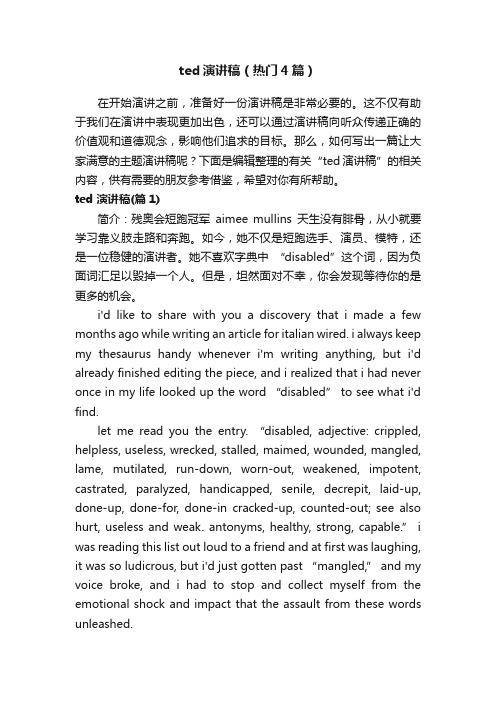
ted演讲稿(热门4篇)在开始演讲之前,准备好一份演讲稿是非常必要的。
这不仅有助于我们在演讲中表现更加出色,还可以通过演讲稿向听众传递正确的价值观和道德观念,影响他们追求的目标。
那么,如何写出一篇让大家满意的主题演讲稿呢?下面是编辑整理的有关“ted演讲稿”的相关内容,供有需要的朋友参考借鉴,希望对你有所帮助。
ted演讲稿(篇1)简介:残奥会短跑冠军aimee mullins天生没有腓骨,从小就要学习靠义肢走路和奔跑。
如今,她不仅是短跑选手、演员、模特,还是一位稳健的演讲者。
她不喜欢字典中“disabled”这个词,因为负面词汇足以毁掉一个人。
但是,坦然面对不幸,你会发现等待你的是更多的机会。
i'd like to share with you a discovery that i made a few months ago while writing an article for italian wired. i always keep my thesaurus handy whenever i'm writing anything, but i'd already finished editing the piece, and i realized that i had never once in my life looked up the word “disabled” to see what i'd find.let me read you the entry. “disabled, adjective: crippled, helpless, useless, wrecked, stalled, maimed, wounded, mangled, lame, mutilated, run-down, worn-out, weakened, impotent, castrated, paralyzed, handicapped, senile, decrepit, laid-up, done-up, done-for, done-in cracked-up, counted-out; see also hurt, useless and weak. an tonyms, healthy, strong, capable.” i was reading this list out loud to a friend and at first was laughing, it was so ludicrous, but i'd just gotten past “mangled,” and my voice broke, and i had to stop and collect myself from the emotional shock and impact that the assault from these words unleashed.you know, of course, this is my raggedy old thesaurus so i'm thinking this must be an ancient print date, right? but, in fact, the print date was the early 1980s, when i would have been starting primary school and forming an understanding of myself outside the family unit and as related to the other kids and the world around me. and, needless to say, thank god i wasn't using a thesaurus back then. i mean, from this entry, it would seem that i was born into a world that perceived someone like me to have nothing positive whatsoever going for them, when in fact, today i'm celebrated for the opportunities and adventures my life has procured.so, i immediately went to look up the __ online edition, e_pecting to find a revision worth noting. here's the updated version of this entry. unfortunately, it's not much better. i find the last two words under “near antonyms,” particularly unsettling: “whole” and “wholesome.”so, it's not just about the words. it's what we believe about people when we name them with these words. it's about the values behind the words, and how we construct those values. our language affects our thinking and how we view the world and how we view other people. in fact, many ancient societies, including the greeks and the romans, believed that to utter a curse verbally was so powerful, because to say the thing out loud brought it into e_istence. so, what reality do we want to call into e_istence: a person who is limited, or a person who's empowered? by casually doing something as simple as naming a person, a child, we might be putting lids and casting shadows on their power. wouldn't we want to open doors for them instead?one such person who opened doors for me was my childhood doctor at the a.i. dupont institute in wilmington,delaware. his name was dr. pizzutillo, an italian american, whose name, apparently, was too difficult for most americans to pronounce, so he went by dr. p. and dr. p always wore really colorful bow ties and had the very perfect disposition to work with children.i loved almost everything about my time spent at this hospital, with the e_ception of my physical therapy sessions. i had to do what seemed like innumerable repetitions of e_ercises with these thick, elastic bands -- different colors, you know -- to help build up my leg muscles, and i hated these bands more than anything -- i hated them, had names for them. i hated them. and, you know, i was already bargaining, as a five year-old child, with dr. p to try to get out of doing these e_ercises, unsuccessfully, of course. and, one day, he came in to my session -- e_haustive and unforgiving, these sessions -- and he said to me, “wow. aimee, you are such a strong and powerful little girl, i think you're going to break one of those bands. when you do break it, i'm going to give you a hundred bucks.”now, of course, this was a simple ploy on dr. p's part to get me to do the e_ercises i didn't want to do before the prospect of being the richest five-year-old in the second floor ward, but what he effectively did for me was reshape an awful daily occurrence into a new and promising e_perience for me. and i have to wonder today to what e_tent his vision and his declaration of me as a strong and powerful little girl shaped my own view of myself as an inherently strong, powerful and athletic person well into the future.this is an e_ample of how adults in positions of power can ignite the power of a child. but, in the previous instances of those thesaurus entries, our language isn't allowing us to evolve intothe reality that we would all want, the possibility of an individual to see themselves as capable. our language hasn't caught up with the changes in our society, many of which have been brought about by technology. certainly, from a medical standpoint, my legs, laser surgery for vision impairment, titanium knees and hip replacements for aging bodies that are allowing people to more fully engage with their abilities, and move beyond the limits that nature has imposed on them -- not to mention social networking platforms allow people to self-identify, to claim their own descriptions of themselves, so they can go align with global groups of their own choosing. so, perhaps technology is revealing more clearly to us now what has always been a truth: that everyone has something rare and powerful to offer our society, and that the human ability to adapt is our greatest asset.the human ability to adapt, it's an interesting thing, because people have continually wanted to talk to me about overcoming adversity, and i'm going to make an admission: this phrase never sat right with me, and i always felt uneasy trying to answer people's questions about it, and i think i'm starting to figure out why. implicit in this phrase of “overcoming adversity” is the idea that success, or happiness, is about emerging on the other side of a challenging e_perience unscathed or unmarked by the e_perience, as if my successes in life have come about from an ability to sidestep or circumnavigate the presumed pitfalls of a life with prosthetics, or what other people perceive as my disability. but, in fact, we are changed. we are marked, of course, by a challenge, whether physically, emotionally or both. and i'm going to suggest that this is a good thing. adversity isn't an obstacle that we need to get around in order to resume living our life. it's part of our life. and i tend to think of it like my shadow.sometimes i see a lot of it, sometimes there's very little, but it's always with me. and, certainly, i'm not trying to diminish the impact, the weight, of a person's struggle.there is adversity and challenge in life, and it's all very real and relative to every single person, but the question isn't whether or not you're going to meet adversity, but how you're going to meet it. so, our responsibility is not simply shielding those we care for from adversity, but preparing them to meet it well. and we do a disservice to our kids when we make them feel that they're not equipped to adapt. there's an important difference and distinction between the objective medical fact of my being an amputee and the subjective societal opinion of whether or not i'm disabled. and, truthfully, the only real and consistent disability i've had to confront is the world ever thinking that i could be described by those definitions.in our desire to protect those we care about by giving them the cold, hard truth about their medical prognosis, or, indeed, a prognosis on the e_pected quality of their life, we have to make sure that we don't put the first brick in a wall that will actually disable someone. perhaps the e_isting model of only looking at what is broken in you and how do we fi_ it, serves to be more disabling to the individual than the pathology itself.by not treating the wholeness of a person, by not acknowledging their potency, we are creating another ill on top of whatever natural struggle they might have. we are effectively grading someone's worth to our community. so we need to see through the pathology and into the range of human capability. and, most importantly, there's a partnership between those perceived deficiencies and our greatest creative ability. so it's not about devaluing, or negating, these more trying times assomething we want to avoid or sweep under the rug, but instead to find those opportunities wrapped in the adversity. so maybe the idea i want to put out there is not so much overcoming adversity as it is opening ourselves up to it, embracing it, grappling with it, to use a wrestling term, maybe even dancing with it. and, perhaps, if we see adversity as natural, consistent and useful, we're less burdened by the presence of it.this year we celebrate the 200th birthday of charles darwin, and it was 150 years ago, when writing about evolution, that darwin illustrated, i think, a truth about the human character. to paraphrase: it's not the strongest of the species that survives, nor is it the most intelligent that survives; it is the one that is most adaptable to change. conflict is the genesis of creation. from darwin's work, amongst others, we can recognize that the human ability to survive and flourish is driven by the struggle of the human spirit through conflict into transformation. so, again, transformation, adaptation, is our greatest human skill. and, perhaps, until we're tested, we don't know what we're made of. maybe that's what adversity gives us: a sense of self, a sense of our own power. so, we can give ourselves a gift. we can re-imagine adversity as something more than just tough times. maybe we can see it as change. adversity is just change that we haven't adapted ourselves to yet.i think the greatest adversity that we've created for ourselves is this idea of normalcy. now, who's normal? there's no normal. there's common, there's typical. there's no normal, and would you want to meet that poor, beige person if they e_isted? (laughter) i don't think so. if we can change this paradigm from one of achieving normalcy to one of possibility -- or potency, to be even a little bit more dangerous -- we can release the power of somany more children, and invite them to engage their rare and valuable abilities with the community.anthropologists tell us that the one thing we as humans have always required of our community members is to be of use, to be able to contribute. there's evidence that neanderthals, 60,000 years ago, carried their elderly and those with serious physical injury, and perhaps it's because the life e_perience of survival of these people proved of value to the community. they didn't view these people as broken and useless; they were seen as rare and valuable.a few years ago, i was in a food market in the town where i grew up in that red zone in northeastern pennsylvania, and i was standing over a bushel of tomatoes. it was summertime: i had shorts on. i hear this guy, his voice behind me say, “well, if it isn't aimee mullins.” and i turn around, and it's this older man. i have no idea who he is.and i said, “i'm sorry, sir, have we met? i don't remember meeting you.”he said, “well, you wouldn't remember meeti ng me. i mean, when we met i was delivering you from your mother's womb.” (laughter) oh, that guy. and, but of course, actually, it did click.this man was dr. kean, a man that i had only known about through my mother's stories of that day, because, of course, typical fashion, i arrived late for my birthday by two weeks. and so my mother's prenatal physician had gone on vacation, so the man who delivered me was a complete stranger to my parents. and, because i was born without the fibula bones, and had feet turned in, and a few toes in this foot and a few toes in that, he had to be the bearer -- this stranger had to be the bearer of bad news.he said to me, “i had to give this prognosis to your parents that you would never walk, and you would never have the kind of mobility that other kids have or any kind of life of independence, and you've been making liar out of me ever since.” (laughter) (applause)the e_traordinary thing is that he said he had saved newspaper clippings throughout my whole childhood, whether winning a second grade spelling bee, marching with the girl scouts, you know, the halloween parade, winning my college scholarship, or any of my sports victories, and he was using it, and integrating it into teaching resident students, med students from hahnemann medical school and hershey medical school. and he called this part of the course the _ factor, the potential of the human will. no prognosis can account for how powerful this could be as a determinant in the quality of someone's life. and dr. k ean went on to tell me, he said, “in my e_perience, unless repeatedly told otherwise, and even if given a modicum of support, if left to their own devices, a child will achieve.”see, dr. kean made that shift in thinking. he understood that there's a difference between the medical condition and what someone might do with it. and there's been a shift in my thinking over time, in that, if you had asked me at 15 years old, if i would have traded prosthetics for flesh-and-bone legs, i wouldn't have hesitated for a second. i aspired to that kind of normalcy back then. but if you ask me today, i'm not so sure. and it's because of the e_periences i've had with them, not in spite of the e_periences i've had with them. and perhaps this shift in me has happened because i've been e_posed to more people who have opened doors for me than those who have put lids and cast shadows on me.see, all you really need is one person to show you the epiphany of your own power, and you're off. if you can hand somebody the key to their own power -- the human spirit is so receptive -- if you can do that and open a door for someone at a crucial moment, you are educating them in the best sense. you're teaching them to open doors for themselves. in fact, the e_act meaning of the word “educate” comes from the root word “educe.” it means “to bring forth what is within, to bring out potential.” so again, which potential do we want to bring out?there was a case study done in 1960s britain, when they were moving from grammar schools to comprehensive schools. it's called the streaming trials. we call it “tracking” here in the states. it's separating students from a, b, c, d and so on. and the “a students” get the tougher curriculum, the best teachers, etc. well, they took, over a three-month period, d-level students, gave them a's, told them they were “a's,” told them they were bright, and at the end of this three-month period, they were performing at a-level.and, of course, the heartbreaking, flip side of this study, is that they took the “a students” and told them they were “d's.” and that's what happened at the end of that three-month period. those who were still around in school, besides the people who had dropped out. a crucial part of this case study was that the teachers were duped too. the teachers didn't know a switch had been made. they were simply told, “these are the 'a-students,' these are the 'd-students.'” and that's how they went about teaching them and treating them.so, i think that the only true disability is a crushed spirit, a spirit that's been crushed doesn't have hope, it doesn't see beauty, it no longer has our natural, childlike curiosity and ourinnate ability to imagine. if instead, we can bolster a human spirit to keep hope, to see beauty in themselves and others, to be curious and imaginative, then we are truly using our power well. when a spirit has those qualities, we are able to create new realities and new ways of being.i'd like to leave you with a poem by a fourteenth-century persian poet named hafiz that my friend, jacques dembois told me about, and the poem is called “the god who only knows four words”: “every child has known god, not the god of names, not the god of don'ts, but the god who only knows four words and keeps repeating them, saying, 'come dance with me. come, dance with me. come, dance with me.'”ted演讲稿(篇2)一直以来,我都是同学、家长眼中“别人家的孩子”,但大家有所不知的是,我一直在与一个“病魔”作斗争,它就是拖延症。
ted英文演讲稿(通用18篇)
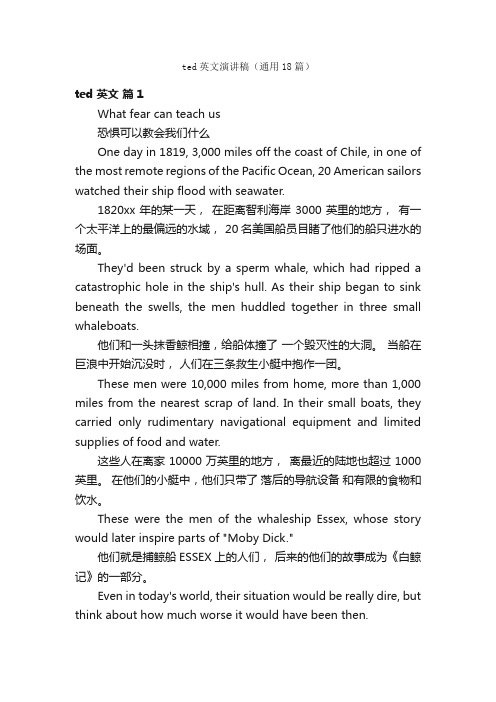
ted英文演讲稿(通用18篇)ted英文篇1What fear can teach us恐惧可以教会我们什么One day in 1819, 3,000 miles off the coast of Chile, in one of the most remote regions of the Pacific Ocean, 20 American sailors watched their ship flood with seawater.1820xx年的某一天,在距离智利海岸3000英里的地方,有一个太平洋上的最偏远的水域, 20名美国船员目睹了他们的船只进水的场面。
They'd been struck by a sperm whale, which had ripped a catastrophic hole in the ship's hull. As their ship began to sink beneath the swells, the men huddled together in three small whaleboats.他们和一头抹香鲸相撞,给船体撞了一个毁灭性的大洞。
当船在巨浪中开始沉没时,人们在三条救生小艇中抱作一团。
These men were 10,000 miles from home, more than 1,000 miles from the nearest scrap of land. In their small boats, they carried only rudimentary navigational equipment and limited supplies of food and water.这些人在离家10000万英里的地方,离最近的陆地也超过1000英里。
在他们的小艇中,他们只带了落后的导航设备和有限的食物和饮水。
2018ted英语演讲稿(4篇)_演讲稿
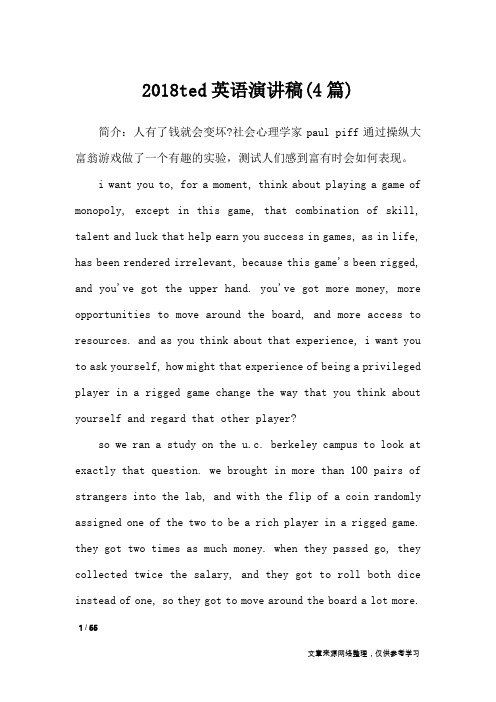
2018ted英语演讲稿(4篇) 简介:人有了钱就会变坏?社会心理学家paul piff通过操纵大富翁游戏做了一个有趣的实验,测试人们感到富有时会如何表现。
i want you to, for a moment, think about playing a game of monopoly, except in this game, that combination of skill, talent and luck that help earn you success in games, as in life, has been rendered irrelevant, because this game's been rigged, and you've got the upper hand. you've got more money, more opportunities to move around the board, and more access to resources. and as you think about that experience, i want you to ask yourself, how might that experience of being a privileged player in a rigged game change the way that you think about yourself and regard that other player?so we ran a study on the u.c. berkeley campus to look at exactly that question. we brought in more than 100 pairs of strangers into the lab, and with the flip of a coin randomly assigned one of the two to be a rich player in a rigged game. they got two times as much money. when they passed go, they collected twice the salary, and they got to roll both dice instead of one, so they got to move around the board a lot more.1 / 55(laughter) and over the course of 15 minutes, we watched through hidden cameras what happened. and what i want to do today, for the first time, is show you a little bit of what we saw. you're going to have to pardon the sound quality, in some cases, because again, these were hidden cameras. so we've provided subtitles. rich player: how many 500s did you have? poor player: just one.rich player: are you serious. poor player: yeah.rich player: i have three. (laughs) i don't know why they gave me so much.paul piff: okay, so it was quickly apparent to players that something was up. one person clearly has a lot more money than the other person, and yet, as the game unfolded, we saw very notable differences and dramatic differences begin to emerge between the two players. the rich player started to move around the board louder, literally smacking the board with their piece as he went around. we were more likely to see signs of dominance and nonverbal signs, displays of power and celebration among the rich players.we had a bowl of pretzels positioned off to the side. it's on the bottom right corner there. that allowed us to watch 2 / 55participants' consummatory behavior. so we're just tracking how many pretzels participants eat.rich player: are those pretzels a trick?poor player: i don't know.pp: okay, so no surprises, people are onto us. they wonder what that bowl of pretzels is doing there in the first place. one even asks, like you just saw, is that bowl of pretzels there as a trick? and yet, despite that, the power of the situation seems to inevitably dominate, and those rich players start to eat more pretzels.rich player: i love pretzels.(laughter)pp: and as the game went on, one of the really interesting and dramatic patterns that we observed begin to emerge was that the rich players actually started to become ruder toward the other person, less and less sensitive to the plight of those poor, poor players, and more and more demonstrative of their material success, more likely to showcase how well they're doing. rich player: i have money for everything. poor player: how much is that? rich player: you owe me 24 dollars. you're going to lose all your money soon. i'll buy it. i have so much 3 / 55money. i have so much money, it takes me forever. rich player 2: i'm going to buy out this whole board. rich player 3: you're going to run out of money soon. i'm pretty much untouchable at this point.pp: okay, and here's what i think was really, really interesting, is that at the end of the 15 minutes, we asked the players to talk about their experience during the game. and when the rich players talked about why they had inevitably won in this rigged game of monopoly -- (laughter) —they talked about what they'd done to buy those different properties and earn their success in the game, and they became far less attuned to all those different features of the situation, including that flip of a coin that had randomly gotten them into that privileged position in the first place. and that's a really, really incredible insight into how the mind makes sense of advantage.now this game of monopoly can be used as a metaphor for understanding society and its hierarchical structure, wherein some people have a lot of wealth and a lot of status, and a lot of people don't. they have a lot less wealth and a lot less status and a lot less access to valued resources. and what my 4 / 55colleagues and i for the last seven years have been doing is studying the effects of these kinds of hierarchies. what we've been finding across dozens of studies and thousands of participants across this country is that as a person's levels of wealth increase, their feelings of compassion and empathy go down, and their feelings of entitlement, of deservingness, and their ideology of self-interest increases. in surveys, we found that it's actually wealthier individuals who are more likely to moralize greed being good, and that the pursuit of self-interest is favorable and moral. now what i want to do today is talk about some of the implications of this ideology self-interest, talk about why we should care about those implications, and end with what might be done.some of the first studies that we ran in this area looked at helping behavior, something social psychologists call pro-social behavior. and we were really interested in who's more likely to offer help to another person, someone who's rich or someone who's poor. in one of the studies, we bring in rich and poor members of the community into the lab and give each of them the equivalent of 10 dollars. we told the participants that they could keep these 10 dollars for themselves, or they 5 / 55could share a portion of it, if they wanted to, with a stranger who is totally anonymous. they'll never meet that stranger and the stranger will never meet them. and we just monitor how much people give. individuals who made 25,000 sometimes under 15,000 dollars a year, gave 44 percent more of their money to the stranger than did individuals making 150,000 or 200,000 dollars a year.we've had people play games to see who's more or less likely to cheat to increase their chances of winning a prize. in one of the games, we actually rigged a computer so that die rolls over a certain score were impossible. you couldn't get above 12 in this game, and yet, the richer you were, the more likely you were to cheat in this game to earn credits toward a $50 cash prize, sometimes by three to four times as much.we ran another study where we looked at whether people would be inclined to take candy from a jar of candy that we explicitly identified as being reserved for children -- (laughter) —participating -- i'm not kidding. i know it sounds like i'm making a joke. we explicitly told participants this jar of candy's for children participating in a developmental lab nearby. they're in studies. this is for them. and we just 6 / 55monitored how much candy participants took. participants who felt rich took two times as much candy as participants who felt poor.we've even studied cars, not just any cars, but whether drivers of different kinds of cars are more or less inclined to break the law. in one of these studies, we looked at whether drivers would stop for a pedestrian that we had posed waiting to cross at a crosswalk. now in california, as you all know, because i'm sure we all do this, it's the law to stop for a pedestrian who's waiting to cross. so here's an example of how we did it. that's our confederate off to the left posing as a pedestrian. he approaches as the red truck successfully stops. in typical california fashion, it's overtaken by the bus who almost runs our pedestrian over. (laughter) now here's an example of a more expensive car, a prius, driving through, and a bmw doing the same. so we did this for hundreds of vehicles on several days, just tracking who stops and who doesn't. what we found was that as the expensiveness of a car increased, the driver's tendencies to break the law increased as well. none of the cars, none of the cars in our least expensive car category broke the law. close to 50 percent of the cars in our most 7 / 55expensive vehicle category broke the law. we've run other studies finding that wealthier individuals are more likely to lie in negotiations, to endorse unethical behavior at work like stealing cash from the cash register, taking bribes, lying to customers.now i don't mean to suggest that it's only wealthy people who show these patterns of behavior. not at all. in fact, i think that we all, in our day-to-day, minute-by-minute lives, struggle with these competing motivations of when, or if, to put our own interests above the interests of other people. and that's understandable because the american dream is an idea in which we all have an equal opportunity to succeed and prosper, as long as we apply ourselves and work hard, and a piece of that means that sometimes, you need to put your own interests above the interests and well-being of other people around you. but what we're finding is that, the wealthier you are, the more likely you are to pursue a vision of personal success, of achievement and accomplishment, to the detriment of others around you. here i've plotted for you the mean household income received by each fifth and top five percent of the population over the last 20 years. in 1993, the differences between the 8 / 55different quintiles of the population, in terms of income, are fairly egregious. it's not difficult to discern that there are differences. but over the last 20 years, that significant difference has become a grand canyon of sorts between those at the top and everyone else. in fact, the top 20 percent of our population own close to 90 percent of the total wealth in this country. we're at unprecedented levels of economic inequality. what that means is that wealth is not only becoming increasingly concentrated in the hands of a select group of individuals, but the american dream is becoming increasingly unattainable for an increasing majority of us. and if it's the case, as we've been finding, that the wealthier you are, the more entitled you feel to that wealth, and the more likely you are to prioritize your own interests above the interests of other people, and be willing to do things to serve that self-interest, well then there's no reason to think that those patterns will change. in fact, there's every reason to think that they'll only get worse, and that's what it would look like if things just stayed the same, at the same linear rate, over the next 20 years.now, inequality, economic inequality, is something we should all be concerned about, and not just because of those 9 / 55at the bottom of the social hierarchy, but because individuals and groups with lots of economic inequality do worse, not just the people at the bottom, everyone. there's a lot of really compelling research coming out from top labs all over the world showcasing the range of things that are undermined as economic inequality gets worse. social mobility, things we really care about, physical health, social trust, all go down as inequality goes up. similarly, negative things in social collectives and societies, things like obesity, and violence, imprisonment, and punishment, are exacerbated as economic inequality increases. again, these are outcomes not just experienced by a few, but that resound across all strata of society. even people at the top experience these outcomes.so what do we do? this cascade of self-perpetuating, pernicious, negative effects could seem like something that's spun out of control, and there's nothing we can do about it, certainly nothing we as individuals could do. but in fact, we've been finding in our own laboratory research that small psychological interventions, small changes to people's values, small nudges in certain directions, can restore levels of egalitarianism and empathy. for instance, reminding people of 10 / 55the benefits of cooperation, or the advantages of community, cause wealthier individuals to be just as egalitarian as poor people. in one study, we had people watch a brief video, just 46 seconds long, about childhood poverty that served as a reminder of the needs of others in the world around them, and after watching that, we looked at how willing people were to offer up their own time to a stranger presented to them in the lab who was in distress. after watching this video, an hour later, rich people became just as generous of their own time to help out this other person, a stranger, as someone who's poor, suggesting that these differences are not innate or categorical, but are so malleable to slight changes in people's values, and little nudges of compassion and bumps of empathy.and beyond the walls of our lab, we're even beginning to see signs of change in society. bill gates, one of our nation's wealthiest individuals, in his harvard commencement speech, talked about the problem facing society of inequality as being the most daunting challenge, and talked about what must be done to combat it, saying, "humanity's greatest advances are not in its discoveries, but in how those discoveries are applied to reduce inequity." and there's the giving pledge, in which more 11 / 55than 100 of our nation's wealthiest individuals are pledginghalf of their fortunes to charity. and there's the emergenceof dozens of grassroots movements, like we are the one percent,the resource generation, or wealth for common good, in whichthe most privileged members of the population, members of theone percent and elsewhere, people who are wealthy, are using their own economic resources, adults and youth alike, that's what's most striking to me, leveraging their own privilege, their own economic resources, to combat inequality by advocating for social policies, changes in social values, and changes in people's behavior, that work against their own economic interests but that may ultimately restore the american dream.thank you.(applause)TED英语演讲稿:坠机让我学到的三件事2018ted英语演讲稿(2) | 灾难到来时,我们会发现看似普通的日常生活是多么可贵。
TED英语演讲稿(优秀6篇)

TED 英语演讲稿 (优秀 6 篇)演讲稿特别注重结构清楚,层次简明。
在我们平凡的日常里,演讲稿对我们的。
作用越来越大,为了让您在写演讲稿时更加简单方便,下面是我为大伙儿带来的6 篇《TED 英语演讲稿》,我们不妨阅读一下,看看是否能有一点抛砖引玉的作用。
We're going to go on a dive to the deep sea, and anyone that's had that lovely opportunity knows that for about two and half hours on the way down, it's a perfectly positively pitch—black world。
And we used to see the most mysterious animals out the windowthat you couldn't describe: these blinking lights —— a world of bioluminescence, like fireflies。
Dr。
Edith Widder —— she's now at the Ocean Research and Conservation Association ——was able to come up with a camera that could capture some of these incredible animals, and that's what you're seeing here on the screen。
好了,我们即将潜入海底深处。
任何一个有过这种美妙机会的人都知道在这两个半小时的下降过程中,是一个完全漆黑的世界。
我们透过窗户会看见世界上各种最神秘的动物,各种无法形容的动物。
ted演讲稿大全
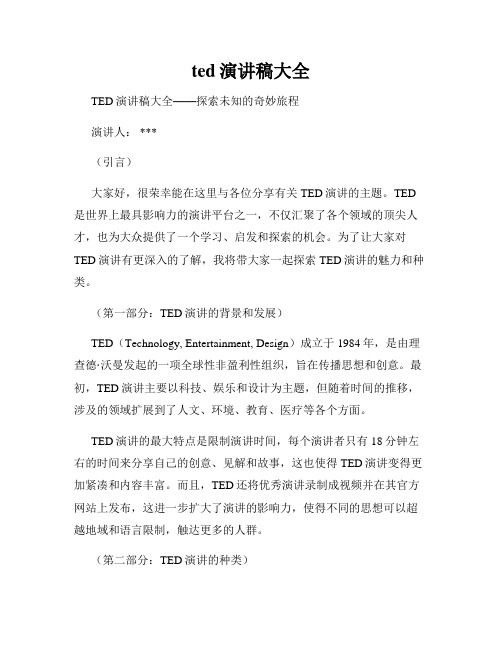
ted演讲稿大全TED演讲稿大全——探索未知的奇妙旅程演讲人: ***(引言)大家好,很荣幸能在这里与各位分享有关TED演讲的主题。
TED 是世界上最具影响力的演讲平台之一,不仅汇聚了各个领域的顶尖人才,也为大众提供了一个学习、启发和探索的机会。
为了让大家对TED演讲有更深入的了解,我将带大家一起探索TED演讲的魅力和种类。
(第一部分:TED演讲的背景和发展)TED(Technology, Entertainment, Design)成立于1984年,是由理查德·沃曼发起的一项全球性非盈利性组织,旨在传播思想和创意。
最初,TED演讲主要以科技、娱乐和设计为主题,但随着时间的推移,涉及的领域扩展到了人文、环境、教育、医疗等各个方面。
TED演讲的最大特点是限制演讲时间,每个演讲者只有18分钟左右的时间来分享自己的创意、见解和故事,这也使得TED演讲变得更加紧凑和内容丰富。
而且,TED还将优秀演讲录制成视频并在其官方网站上发布,这进一步扩大了演讲的影响力,使得不同的思想可以超越地域和语言限制,触达更多的人群。
(第二部分:TED演讲的种类)TED演讲可以分为多种类型,既有个人成长和领导力的演讲,也有艺术、科技和创新的演讲。
首先,个人成长和领导力的演讲是TED演讲中的重要组成部分。
这类演讲主要涵盖思维方式、人际关系、自我管理等方面的内容。
通过分享自己的经验和故事,演讲者试图激励观众探索自己的潜能,提高个人的成长和领导能力。
其次,艺术、科技和创新的演讲是TED演讲的核心内容。
这类演讲呈现了当代最前沿的科学、技术和艺术的进展,帮助我们了解世界的变化以及创新所带来的机遇和挑战。
同时,这些演讲也为我们提供了思考未来的角度和可能性。
最后,TED演讲中还有一类非常特殊的演讲,即那些用个人独特的经历和视角来探索人类精神、情感和社会问题的演讲。
这些演讲会引起观众共鸣,让我们从另一个角度审视生活的本质和意义。
(第三部分:TED演讲的魅力)TED演讲之所以能够吸引人们的注意力和激起共鸣,是因为它具有一些独特的魅力。
【2018-2019】ted演讲稿集(6篇)-优秀word范文 (1页)
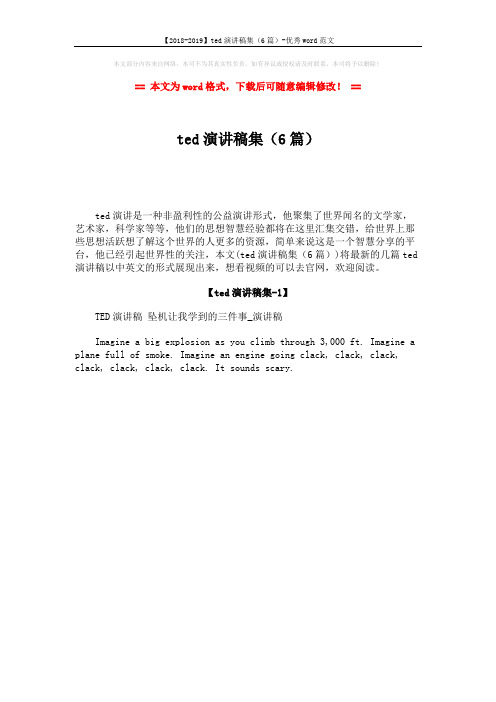
【2018-2019】ted演讲稿集(6篇)-优秀word范文
本文部分内容来自网络,本司不为其真实性负责,如有异议或侵权请及时联系,本司将予以删除!
== 本文为word格式,下载后可随意编辑修改! ==
ted演讲稿集(6篇)
ted演讲是一种非盈利性的公益演讲形式,他聚集了世界闻名的文学家,艺术家,科学家等等,他们的思想智慧经验都将在这里汇集交错,给世界上那些思想活跃想了解这个世界的人更多的资源,简单来说这是一个智慧分享的平台,他已经引起世界性的关注,本文(ted演讲稿集(6篇))将最新的几篇ted 演讲稿以中英文的形式展现出来,想看视频的可以去官网,欢迎阅读。
【ted演讲稿集-1】
TED演讲稿坠机让我学到的三件事_演讲稿
Imagine a big explosion as you climb through 3,000 ft. Imagine a plane full of smoke. Imagine an engine going clack, clack, clack, clack, clack, clack, clack. It sounds scary.。
TED演讲稿(5篇范文)
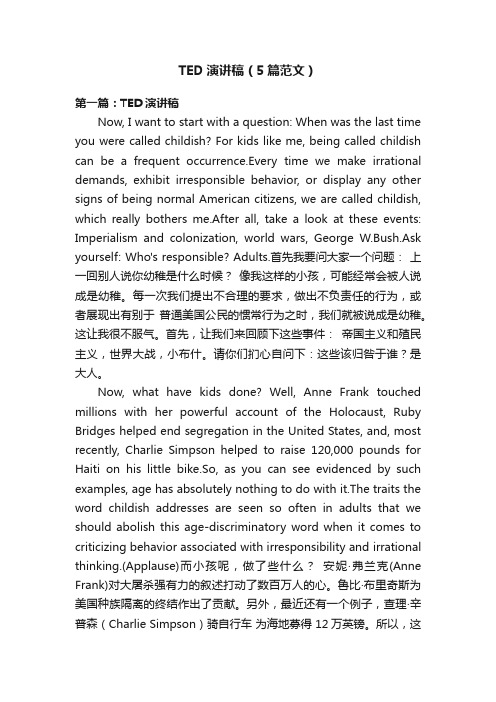
TED演讲稿(5篇范文)第一篇:TED演讲稿Now, I want to start with a question: When was the last time you were called childish? For kids like me, being called childish can be a frequent occurrence.Every time we make irrational demands, exhibit irresponsible behavior, or display any other signs of being normal American citizens, we are called childish, which really bothers me.After all, take a look at these events: Imperialism and colonization, world wars, George W.Bush.Ask yourself: Who's responsible? Adults.首先我要问大家一个问题:上一回别人说你幼稚是什么时候?像我这样的小孩,可能经常会被人说成是幼稚。
每一次我们提出不合理的要求,做出不负责任的行为,或者展现出有别于普通美国公民的惯常行为之时,我们就被说成是幼稚。
这让我很不服气。
首先,让我们来回顾下这些事件:帝国主义和殖民主义,世界大战,小布什。
请你们扪心自问下:这些该归咎于谁?是大人。
Now, what have kids done? Well, Anne Frank touched millions with her powerful account of the Holocaust, Ruby Bridges helped end segregation in the United States, and, most recently, Charlie Simpson helped to raise 120,000 pounds for Haiti on his little bike.So, as you can see evidenced by such examples, age has absolutely nothing to do with it.The traits the word childish addresses are seen so often in adults that we should abolish this age-discriminatory word when it comes to criticizing behavior associated with irresponsibility and irrational thinking.(Applause)而小孩呢,做了些什么?安妮·弗兰克(Anne Frank)对大屠杀强有力的叙述打动了数百万人的心。
【最新2018】名人ted演讲集-名人ted演讲稿下载【中英文】-实用word文档 (1页)
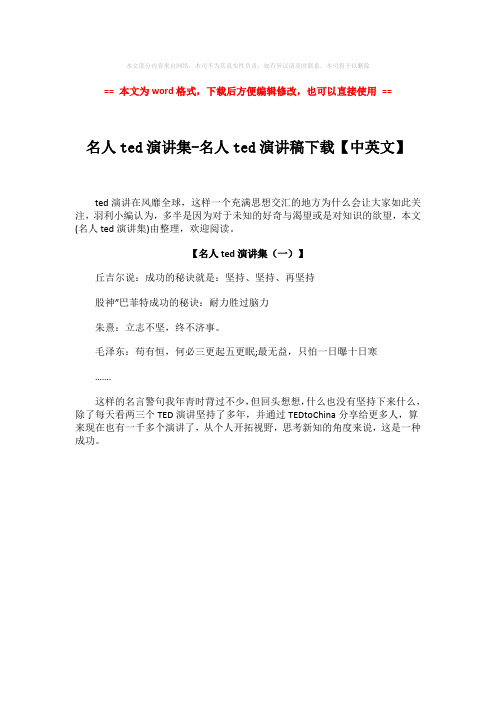
本文部分内容来自网络,本司不为其真实性负责,如有异议请及时联系,本司将予以删除== 本文为word格式,下载后方便编辑修改,也可以直接使用==
名人ted演讲集-名人ted演讲稿下载【中英文】
ted演讲在风靡全球,这样一个充满思想交汇的地方为什么会让大家如此关注,羽利小编认为,多半是因为对于未知的好奇与渴望或是对知识的欲望,本文(名人ted演讲集)由整理,欢迎阅读。
【名人ted演讲集(一)】
丘吉尔说:成功的秘诀就是:坚持、坚持、再坚持
股神”巴菲特成功的秘诀:耐力胜过脑力
朱熹:立志不坚,终不济事。
毛泽东:苟有恒,何必三更起五更眠;最无益,只怕一日曝十日寒
…….
这样的名言警句我年青时背过不少,但回头想想,什么也没有坚持下来什么,除了每天看两三个TED演讲坚持了多年,并通过TEDtoChina分享给更多人,算来现在也有一千多个演讲了,从个人开拓视野,思考新知的角度来说,这是一种成功。
经典TED英语演讲稿范文(精选15篇)
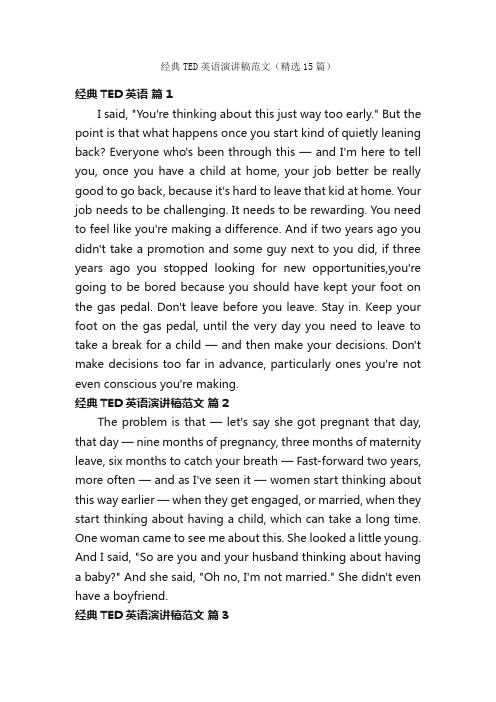
经典TED英语演讲稿范文(精选15篇)经典TED英语篇1I said, "You're thinking about this just way too early." But the point is that what happens once you start kind of quietly leaning back? Everyone who's been through this — and I'm here to tell you, once you have a child at home, your job better be really good to go back, because it's hard to leave that kid at home. Your job needs to be challenging. It needs to be rewarding. You need to feel like you're making a difference. And if two years ago you didn't take a promotion and some guy next to you did, if three years ago you stopped looking for new opportunities,you're going to be bored because you should have kept your foot on the gas pedal. Don't leave before you leave. Stay in. Keep your foot on the gas pedal, until the very day you need to leave to take a break for a child — and then make your decisions. Don't make decisions too far in advance, particularly ones you're not even conscious you're making.经典TED英语演讲稿范文篇2The problem is that — let's say she got pregnant that day, that day — nine months of pregnancy, three months of maternity leave, six months to catch your breath — Fast-forward two years, more often — and as I've seen it — women start thinking about this way earlier — when they get engaged, or married, when they start thinking about having a child, which can take a long time. One woman came to see me about this. She looked a little young. And I said, "So are you and your husband thinking about having a baby?" And she said, "Oh no, I'm not married." She didn't even have a boyfriend.经典TED英语演讲稿范文篇3I think the cause is more complicated. I think, as a society, we put more pressure on our boys to succeedthan we do on our girls.I know men that stay home and work in the home to support wives with careers,and it's hard. When I go to the Mommy-and-Me stuff and I see the father there, I notice that the other mommies don't play with him. And that's a problem, because we have to make it as important a job,because it's the hardest job in the world to work inside the home, for people of both genders, if we're going to even things out and let women stay in the workforce. Studies show that households with equal earning and equal responsibility also have half the divorce rate.And if that wasn't good enough motivation for everyone out there, they also have more — how shall I say this on this stage?经典TED英语演讲稿范文篇4They know each other more in the biblical sense as well. Message number three: Don't leave before you leave. I think there's a really deep irony to the fact that actions women are taking —and I see this all the time —with the objective of staying in the workforceactually lead to their eventually leaving. Here's what happens: We're all busy. Everyone's busy. A woman's busy. And she starts thinking about having a child, and from the moment she starts thinking about having a child, she starts thinking about making room for that child. "How am I going to fit this into everything else I'm doing?" And literally from that moment, she doesn't raise her hand anymore, she doesn't look for a promotion, she doesn't take on the new project, she doesn't say, "Me. I want to do that." She starts leaning back.经典TED英语演讲稿范文篇5My generation really, sadly, is not going to change the numbers at the top. They're just not moving. We are not goingto get to where 50 percent of the population — in my generation, there will not be 50 percent of [women] at the top of any industry. But I'm hopeful that future generations can. I think a world where half of our countries and our companies were run by women, would be a better world. It's not just because people would know where the women's bathrooms are, even though that would be very helpful.I think it would be a better world. I have two children.I have a five-year-old son and a two-year-old daughter. I want my son to have a choice to contribute fully in the workforce or at home, and I want my daughter to have the choice to not just succeed, but to be liked for her accomplishments.经典TED英语演讲稿范文篇6Hello everybody!Outstanding during the period in school, eager to have its own personality, strong teamwork spirit, but also no lack of independence, the ability to accept new things, but dedicated Lok Kwan, in a certain professional ability to innovate.I am a person who loves design, believe the design will be in his future career, I also believe that they will have a designer should be the quality because I am a motivated person, I will work hard and aggressive! Although I do not have much social experience, but I will redouble our efforts to make up our deficiencies, I believe that life will not be a moment of a particular cell, but the extent depends on their struggle, is an adherent of the study, self-improving process!I am a girl from Shandong Yantai, I think people should have nothing exciting life tends to level customs, and should have their own pursuits, the courage to challenge the limits of life, because I believe in the potential is very large , will only play a certain pressure, so I would prefer a greater competitive pressure for methe environment to life! This life is a positive, happy! This is the life of the rich! I have been in all aspects of the University of enriched themselves as outstanding, I was fortunate to have chosen our city planning department, as my mentor, in the past two years, I have to follow the instructors have done a lot of projects, including program design, graphics, etc. , with better graphics operation ability, and all aspects of my design thi#from end#nking divergent, thus, also trained me to do something serious and responsible, pragmatic fine style, our work has always been to create a harmonious home man, I would like to do work attitude is very important!Thank you!经典TED英语演讲稿范文篇7My mother was right – because you will encounter difficult times in your life, requiring tough decisions and tough time-sensitive responses.My first taste of adversity came in 1969, when I helped to integrate a private school in my home city of Atlanta. I was a handful of…I was one of a handful of African-American students – student of color #8 – who passed the entrance exam and was admitted to attend. Now while passing the exam was the technical requirement for admission and acceptance, it was not the path to acceptance from my peers. In fact, from 7th grade to 12th grade, I endured being called the N-word at least once a day.It was tough to get through a single day, let alone come back and repeat the entire process all over again. I can recall that I told my mother I didn’t want to go to school there anymore; the challenges were just too much. And she would repeat the washing machine adage to me more times than I can count.经典TED英语演讲稿范文篇8Hello! Dear judges,Today, I am gonna share my first special memory. I explored Vanuatu last August. Vanuatu is a Pacific island adventure far beyond any notions of cruise-ship ports and flashy resorts. Deserted beaches, ancient culture, remote and rugged islands and world-class diving are just a small part of this magnetism of this scattered 80-plus island archipelago.The capital is Port Vila. It was used to be a British and French colony, so a lot of people speak English and French. Vanuatu is a natural place, the sky is very blue, the sea water is very clear, the local law does not allow any fishing, you can see fish swimming around the sea. The vegetable market is lots of vegetables and fruits that I have not been seen before.It takes a little time to afford a healthy sense of adventure to truly explore Vanuatu's islands, but it's worth every bit of it. Thank you!经典TED英语演讲稿范文篇9So, I’m not just asking you, I’m advising you to anticipate defeat, strongly advising it. Don’t be surprised when it comes your way. Acknowledge it. Engage with inquisitive abandon and leave indelible fingerprints wherever you may go. Search for environments that may give you grief but they may also help you to grow.Now, no one taught me the importance of that existential exploration better than my parents. And it was my father who showed me that in fact, it is in discomfort that we find our most defining moments.My dad became a doctor because he knew the circumstances were not the same for everybody, that some people were not as fortunate as our family was. And as he put it, he wanted toeliminate “dis-ea se.” Are you with me, graduates? “Dis-ease.” That’s exactly how he said it to me.When I was a little girl, I would go on house calls with him. The patients all knew and loved him and I saw how much he prided himself on being a caretaker, someone who did his very best to reverse their compromised positions of his patients – to put their mind and bodies at ease.But there was one house call I remember in particular. It’s seared in the back of my brain as if it happened yesterday. His diabetic patient was having a hypoglycemic attack. He told me to get the orange juice. I did, and I watched him save a woman’s life that day.经典TED英语演讲稿范文篇10Dear teacher and classmates:I am very glad to make a speech here in this class again! This time, I'd like to talk something about English.I love English. English language is now used everywhere in the world. It has become the most common language on Internet and for international trade. Learning English makes me confident and brings me great pleasure.When I was seven, my mother sent me to an English school. At there, I played games and sang English songs with other children . Then I discovered the beauty of the language, and began my colorful dream in the English world.Everyday, I read English following the tapes. Sometimes, I watch English cartoons.On the weekend, I often go to the English corner. By talking with different people there, I have made more and more friends as well as improved my oral English.I hope I can travel around the world someday. I want to goto America to visit Washington Monument, because the president Washington is my idol. Of course, I want to go to London too, because England is where English language developed. If I can ride my bike in Cambridge university, I will be very happy.I hope I can speak English with everyone in the world. I'll introduce China to them, such as the Great Wall, the Forbidden City and Anshan.I know, Rome was not built in a day. I believe that after continuous hard study, one day I can speak English very well.If you want to be loved, you should learn to love and be lovable. So I believe as I love English everyday , it will love me too. 经典TED英语演讲稿范文篇11Life is short, before you realize it, you have missed the opportunity to accompany those important people in your life, and more importantly, to let them sense your love and gratitude towards them.When I was young, like any other young people who aspire to explore the outside world, I joined a multinational company, upon graduation. I subsequently moved to Hong Kong to work and eventually settled down in Singapore and started my own family. Over the years I indeed saw many parts of the world, especially in my current job. The preparation for icebreaker speech last night allowed me to take a reflection on whether I havedone enough for these important people while I am constantly shuttling here andthere to satiate my own desire.经典TED英语演讲稿范文篇12He quitted from school at grade 10 (16 years old). This super star seems a little bit low self-esteem in front of MBA crowd.Not owning a "piece of paper" (certificate) + too youngaffect business. That's true in real world!I'd found my own business too. At that time, those experienced people just didn't trust a kid like me, although they think my product is great and prudence.I think he doesn't need to regret his education. It's only different kind of life. And I doubt if a person is fully educated and have a comfortable life, will s/he brave enough to try something new? Or create something that is not exists in the world?He found Post Production Office Limited (PO) when he's 22. PO is a company to do video post-production business. It captured more than 50% market share. Although it's based on geographical shortage, it is still a crazy figure. In the post-production industry, PO is the first company to enter the mainland market (China).How can he do that? I truly believe that it's because of his passion, management style and split of never-give-up.。
ted演讲里的演讲稿6篇

ted演讲里的演讲稿6篇(实用版)编制人:__________________审核人:__________________审批人:__________________编制单位:__________________编制时间:____年____月____日序言下载提示:该文档是本店铺精心编制而成的,希望大家下载后,能够帮助大家解决实际问题。
文档下载后可定制修改,请根据实际需要进行调整和使用,谢谢!并且,本店铺为大家提供各种类型的实用资料,如工作报告、工作计划、心得体会、合同方案、演讲稿、作文大全、教案、述职报告、调查报告、其他资料等等,想了解不同资料格式和写法,敬请关注!Download tips: This document is carefully compiled by this editor.I hope that after you download it, it can help you solve practical problems. The document can be customized and modified after downloading, please adjust and use it according to actual needs, thank you!Moreover, our store provides various types of practical materials for everyone, such as work reports, work plans, reflections, contract proposals, speeches, essay summaries, lesson plans, job reports, investigation reports, and other materials. If you want to learn about different data formats and writing methods, please stay tuned!ted演讲里的演讲稿6篇演讲稿是大家传递自己信念和价值观的媒介,能够激发听众的思想和情感,演讲稿是将个人情感与公众共鸣的桥梁,以下是本店铺精心为您推荐的ted演讲里的演讲稿6篇,供大家参考。
ted演讲稿大全
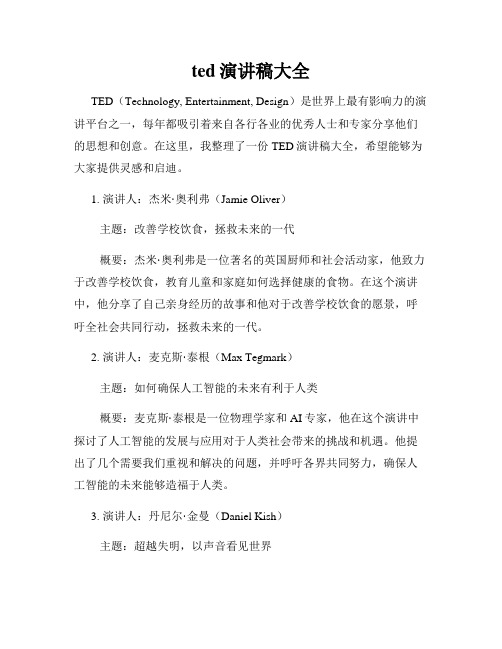
ted演讲稿大全TED(Technology, Entertainment, Design)是世界上最有影响力的演讲平台之一,每年都吸引着来自各行各业的优秀人士和专家分享他们的思想和创意。
在这里,我整理了一份TED演讲稿大全,希望能够为大家提供灵感和启迪。
1. 演讲人:杰米·奥利弗(Jamie Oliver)主题:改善学校饮食,拯救未来的一代概要:杰米·奥利弗是一位著名的英国厨师和社会活动家,他致力于改善学校饮食,教育儿童和家庭如何选择健康的食物。
在这个演讲中,他分享了自己亲身经历的故事和他对于改善学校饮食的愿景,呼吁全社会共同行动,拯救未来的一代。
2. 演讲人:麦克斯·泰根(Max Tegmark)主题:如何确保人工智能的未来有利于人类概要:麦克斯·泰根是一位物理学家和AI专家,他在这个演讲中探讨了人工智能的发展与应用对于人类社会带来的挑战和机遇。
他提出了几个需要我们重视和解决的问题,并呼吁各界共同努力,确保人工智能的未来能够造福于人类。
3. 演讲人:丹尼尔·金曼(Daniel Kish)主题:超越失明,以声音看见世界概要:丹尼尔·金曼失去了视力,但他通过发展一套独特的技巧,通过声音来感知周围的环境和物体。
在这个演讲中,他分享了自己克服困境的经验和对于障碍者如何以一种不同的方式与世界互动的思考,希望能够改变人们对于残疾人的认知和态度。
4. 演讲人:芮辉(Hui Ru)主题:女人,你可以更自信概要:芮辉是中国知名职场女性指导专家,她在演讲中分享了自己的职业经历和对于女性自信的理解。
她鼓励女性多展现自己的能力和魅力,并提出一些实用的建议和技巧,帮助女性在职场和生活中更加自信,实现自我价值。
5. 演讲人:盖尔·博曼(Gail Bowen)主题:诗歌的力量概要:盖尔·博曼是一位加拿大作家和诗人,她在这个演讲中分享了自己对于诗歌的热爱和对于诗歌表达力量的理解。
ted演讲稿范文精彩6篇
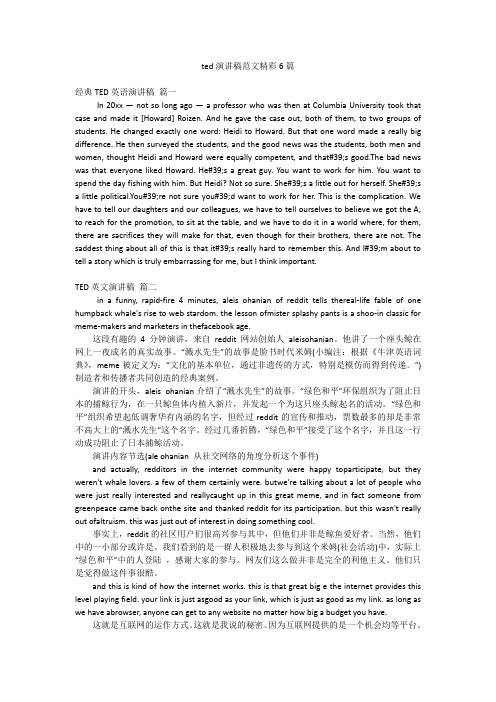
ted演讲稿范文精彩6篇经典TED英语演讲稿篇一In 20xx — not so long ago — a professor who was then at Columbia University took that case and made it [Howard] Roizen. And he gave the case out, both of them, to two groups of students. He changed exactly one word: Heidi to Howard. But that one word made a really big difference. He then surveyed the students, and the good news was the students, both men and women, thought Heidi and Howard were equally competent, and that#39;s good.The bad news was that everyone liked Howard. He#39;s a great guy. You want to work for him. You want to spend the day fishing with him. But Heidi? Not so sure. She#39;s a little out for herself. She#39;s a little political.You#39;re not sure you#39;d want to work for her. This is the complication. We have to tell our daughters and our colleagues, we have to tell ourselves to believe we got the A, to reach for the promotion, to sit at the table, and we have to do it in a world where, for them, there are sacrifices they will make for that, even though for their brothers, there are not. The saddest thing about all of this is that it#39;s really hard to remember this. And I#39;m about to tell a story which is truly embarrassing for me, but I think important.TED英文演讲稿篇二in a funny, rapid-fire 4 minutes, aleis ohanian of reddit tells thereal-life fable of one humpback whale's rise to web stardom. the lesson ofmister splashy pants is a shoo-in classic for meme-makers and marketers in thefacebook age.这段有趣的4分钟演讲,来自reddit 网站创始人aleisohanian。
ted演讲稿(精选17篇)
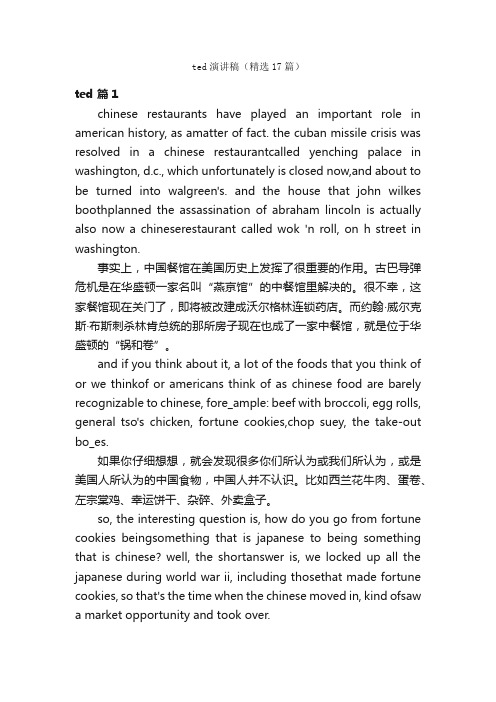
ted演讲稿(精选17篇)ted 篇1chinese restaurants have played an important role in american history, as amatter of fact. the cuban missile crisis was resolved in a chinese restaurantcalled yenching palace in washington, d.c., which unfortunately is closed now,and about to be turned into walgreen's. and the house that john wilkes boothplanned the assassination of abraham lincoln is actually also now a chineserestaurant called wok 'n roll, on h street in washington.事实上,中国餐馆在美国历史上发挥了很重要的作用。
古巴导弹危机是在华盛顿一家名叫“燕京馆”的中餐馆里解决的。
很不幸,这家餐馆现在关门了,即将被改建成沃尔格林连锁药店。
而约翰·威尔克斯·布斯刺杀林肯总统的那所房子现在也成了一家中餐馆,就是位于华盛顿的“锅和卷”。
and if you think about it, a lot of the foods that you think of or we thinkof or americans think of as chinese food are barely recognizable to chinese, fore_ample: beef with broccoli, egg rolls, general tso's chicken, fortune cookies,chop suey, the take-out bo_es.如果你仔细想想,就会发现很多你们所认为或我们所认为,或是美国人所认为的中国食物,中国人并不认识。
ted演讲稿范文(精选8篇)
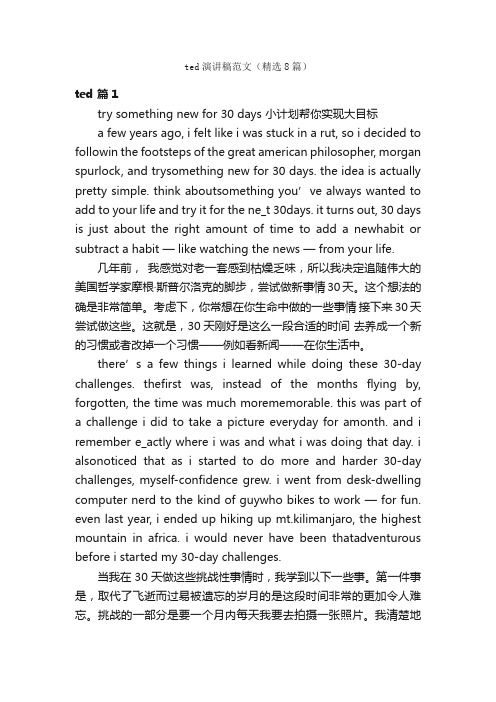
ted演讲稿范文(精选8篇)ted 篇1try something new for 30 days 小计划帮你实现大目标a few years ago, i felt like i was stuck in a rut, so i decided to followin the footsteps of the great american philosopher, morgan spurlock, and trysomething new for 30 days. the idea is actually pretty simple. think aboutsomething you’ve always wanted to add to your life and try it for the ne_t 30days. it turns out, 30 days is just about the right amount of time to add a newhabit or subtract a habit — like watching the news — from your life.几年前,我感觉对老一套感到枯燥乏味,所以我决定追随伟大的美国哲学家摩根·斯普尔洛克的脚步,尝试做新事情30天。
这个想法的确是非常简单。
考虑下,你常想在你生命中做的一些事情接下来30天尝试做这些。
这就是,30天刚好是这么一段合适的时间去养成一个新的习惯或者改掉一个习惯——例如看新闻——在你生活中。
there’s a few things i learned while doing these 30-day challenges. thefirst was, instead of the months flying by, forgotten, the time was much morememorable. this was part of a challenge i did to take a picture everyday for amonth. and i remember e_actly where i was and what i was doing that day. i alsonoticed that as i started to do more and harder 30-day challenges, myself-confidence grew. i went from desk-dwelling computer nerd to the kind of guywho bikes to work — for fun. even last year, i ended up hiking up mt.kilimanjaro, the highest mountain in africa. i would never have been thatadventurous before i started my 30-day challenges.当我在30天做这些挑战性事情时,我学到以下一些事。
2018年TEd演讲读后感-范文模板 (5页)
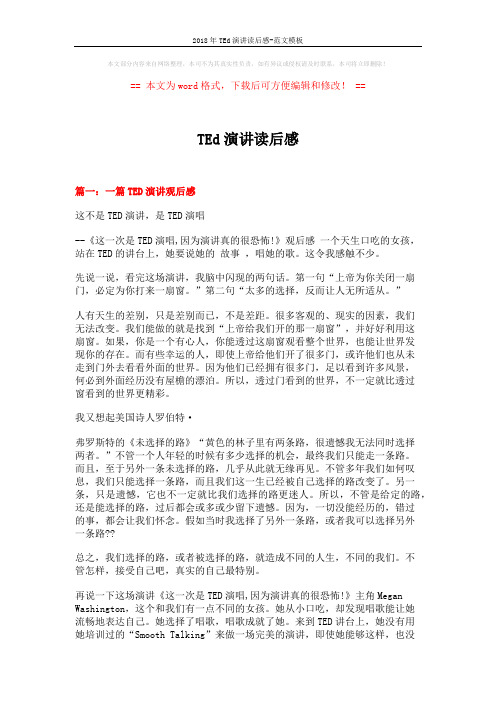
本文部分内容来自网络整理,本司不为其真实性负责,如有异议或侵权请及时联系,本司将立即删除!== 本文为word格式,下载后可方便编辑和修改! ==TEd演讲读后感篇一:一篇TED演讲观后感这不是TED演讲,是TED演唱--《这一次是TED演唱,因为演讲真的很恐怖!》观后感一个天生口吃的女孩,站在TED的讲台上,她要说她的故事,唱她的歌。
这令我感触不少。
先说一说,看完这场演讲,我脑中闪现的两句话。
第一句“上帝为你关闭一扇门,必定为你打来一扇窗。
”第二句“太多的选择,反而让人无所适从。
”人有天生的差别,只是差别而已,不是差距。
很多客观的、现实的因素,我们无法改变。
我们能做的就是找到“上帝给我们开的那一扇窗”,并好好利用这扇窗。
如果,你是一个有心人,你能透过这扇窗观看整个世界,也能让世界发现你的存在。
而有些幸运的人,即使上帝给他们开了很多门,或许他们也从未走到门外去看看外面的世界。
因为他们已经拥有很多门,足以看到许多风景,何必到外面经历没有屋檐的漂泊。
所以,透过门看到的世界,不一定就比透过窗看到的世界更精彩。
我又想起美国诗人罗伯特·弗罗斯特的《未选择的路》“黄色的林子里有两条路,很遗憾我无法同时选择两者。
”不管一个人年轻的时候有多少选择的机会,最终我们只能走一条路。
而且,至于另外一条未选择的路,几乎从此就无缘再见。
不管多年我们如何叹息,我们只能选择一条路,而且我们这一生已经被自己选择的路改变了。
另一条,只是遗憾,它也不一定就比我们选择的路更迷人。
所以,不管是给定的路,还是能选择的路,过后都会或多或少留下遗憾。
因为,一切没能经历的,错过的事,都会让我们怀念。
假如当时我选择了另外一条路,或者我可以选择另外一条路??总之,我们选择的路,或者被选择的路,就造成不同的人生,不同的我们。
不管怎样,接受自己吧,真实的自己最特别。
再说一下这场演讲《这一次是TED演唱,因为演讲真的很恐怖!》主角Megan Washington,这个和我们有一点不同的女孩。
- 1、下载文档前请自行甄别文档内容的完整性,平台不提供额外的编辑、内容补充、找答案等附加服务。
- 2、"仅部分预览"的文档,不可在线预览部分如存在完整性等问题,可反馈申请退款(可完整预览的文档不适用该条件!)。
- 3、如文档侵犯您的权益,请联系客服反馈,我们会尽快为您处理(人工客服工作时间:9:00-18:30)。
本文部分内容来自网络,本司不为其真实性负责,如有异议请及时联系,本司将予以删除== 本文为word格式,下载后方便编辑修改,也可以直接使用==
ted演讲稿集(6篇)
ted演讲是一种非盈利性的公益演讲形式,他聚集了世界闻名的文学家,艺术家,科学家等等,他们的思想智慧经验都将在这里汇集交错,给世界上那些思想活跃想了解这个世界的人更多的资源,简单来说这是一个智慧分享的平台,他已经引起世界性的关注,本文(ted演讲稿集(6篇))将最新的几篇ted演讲稿以中英文的形式展现出来,想看视频的可以去官网,欢迎阅读。
【ted演讲稿集-1】
TED演讲稿坠机让我学到的三件事_演讲稿
Imagine a big explosion as you climb through 3,000 ft. Imagine a plane full of smoke. Imagine an engine going clack, clack, clack, clack, clack, clack, clack. It sounds scary.。
